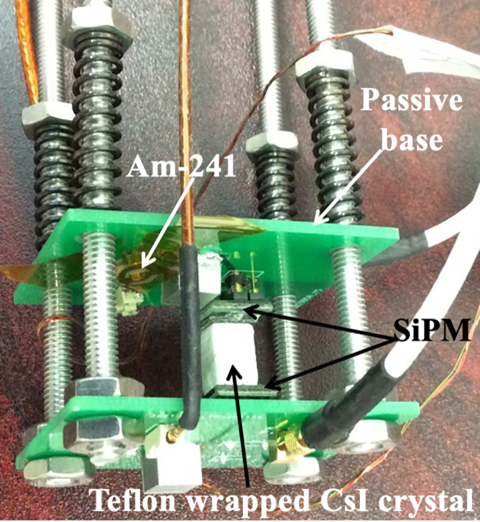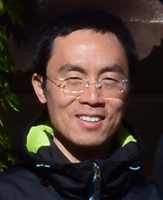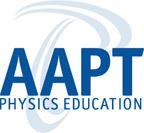- Home
- What We Do
- Laboratory Immersions
- Immersions 2023
- Imm2023USD_CsI-SiPM_Detectors
University of South Dakota, Vermillion, SD
Radiation Detection with CsI + SiPM Detectors
Dates: Aug. 10, 2023 to Aug. 12, 2023
Number of setups available: 3
Maximum number of participants: 6
------------------------------------------------------------------------------------------------------------------------------------------
 Thalium doped cesium iodide, or CsI(Tl) in short, is a common inorganic scintillating material used in many particle physics experiments for radiation detection. Compared to organic scintillators, CsI(Tl) emits more scintillation photons (higher light yield) given the same energy deposition. Compared to emerging high light yield scintillators, CsI(Tl) can be grown in large quantities and is much more cost-effective. Compared to NaI(Tl), the most common scintillating crystal, CsI(Tl) is mechanically stronger, and much less hygroscopic. It also has a relatively high density and is good at absorbing high energy gamma rays. All these makes CsI(Tl) a well balanced scintillating material.
Thalium doped cesium iodide, or CsI(Tl) in short, is a common inorganic scintillating material used in many particle physics experiments for radiation detection. Compared to organic scintillators, CsI(Tl) emits more scintillation photons (higher light yield) given the same energy deposition. Compared to emerging high light yield scintillators, CsI(Tl) can be grown in large quantities and is much more cost-effective. Compared to NaI(Tl), the most common scintillating crystal, CsI(Tl) is mechanically stronger, and much less hygroscopic. It also has a relatively high density and is good at absorbing high energy gamma rays. All these makes CsI(Tl) a well balanced scintillating material.
Scintillation photons can be collected by Silicon PhotoMultipliers, or SiPM in short. A SiPM consists of an array of avalanche photodiodes made on a thin silicon wafer. Compared to the more traditional photomultiplier tube, or PMT in short, SiPM occupies much less space, requires much less operating voltage, offers a similar amplification factor, but higher light detection efficiency.
The combination of CsI(Tl) + SiPM is a cost-effective solution of a practically useful radiation detection system. A crystal as small as can already offer a good absorption of MeV gamma-rays but costs less than $50. A SiPM with a sensitive area of costs about $10. The passive SiPM readout PCB can be made in the immersion with a cost less than $5. A commercial power supply costs about $100. The output can be directly fed into an oscilloscope or a digitizer that has ~100 MHz sampling rate.
In this three-day immersion, we will assemble a CsI(Tl) + SiPM system, take energy calibration data with it and then use it to identify some unknown radioactive sources.
Day 1, morning:
Basic theory of radiation detection
Working principle of scintillating crystals and SiPMs
Day 1, afternoon:
Solder passive components on a readout PCB
Assemble CsI(Tl) + SiPM + readout PCB + DC power supply
Day 2, morning:
Debug the assembly using an oscilloscope and a radioactive source
Take single photoelectron spectrum
Day 2, afternoon:
Take energy calibration data with various sources
Day 3, morning:
Find out the light yield of the detector system through basic data analysis
Day 3, afternoon:
Practice using the system to identify unknown radioactive materials
By the end of the immersion, participants should be able to establish a cost-effective yet practically useful radiation detection system based on a small CsI(Tl) crystal.
Participants do not need to take any material except for their personal laptops.

Dr. Jing Liu is an associate professor at the University of South Dakota with 20 years of experience on experimental particle physics, ranging from electron-positron collider to neutrino and dark matter detections. He is particularly interested in the development of novel radiation detector systems for neutrino and dark matter detections. His recent reseach focus is on the cryogenic undoped CsI crystals, which offers twice higher light yields than CsI(Tl) at room temperature. The technology will be used to build a neutrino and dark matter detector at the Spallation Neutron Source, Oak Ridge National Laboratory.
Dr. Jing Liu. Email: jing.liu@usd.edu




